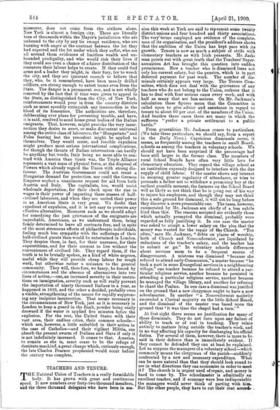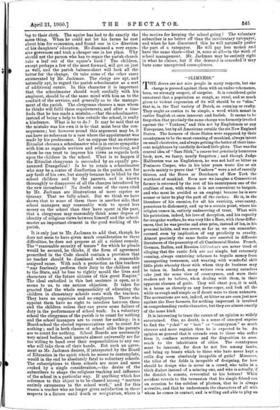TEACHERS AND TENURE. T HE National Union of Teachers is a
really formidable body. It has grown with great and continuous speed. It now numbers over forty-two thousand members, and-the three thousand delegates who have been in see- sion this week at York are ilia to represent some twenty. district unions and four hundred and thirty -associatione. The very' terms. employed are evidence of the coroplete. ness of its organisation, and the president's address shows that the ambition of-the Union has kept pace with its growth. Tenure is now as much a subject of strife with elementary teachers as with Irish peasants. Mr. Jack- man points out with great truth that the Teachers' Super- annuation Act has brought this question into sudden prominence. Now a teacher who is dismissed loses not only his current salary, but the pension, which is in part deferred payment for past work. The number of dis- missals certainly appears very large. The Tenure Com- mittee, which does not deal with the grievances of any teachers who do not belong to the Union, reckons that it has to deal with four serious cases every week, and with half as many that are less serious. On Mr. Jackman'a calculation these figures mean that the Committee is called upon to give advice and assistance in regard to tenure to about 60 per cent. of the members of the Union. And besides these cases there are many in which the sufferers "prefer a private settlement to a public battle."
From generalities Mr. Jackman comes to particulars. (We take these particulars, we should say, from a report in the Daily News.) Capricious dismissals occur, it seems, as frequently among the teachers in small Board. schools as among the teachers in voluntary schools. We should not have been surprised if the percentage had been still larger in the former class. The members of rural School Boards have often very little love for elementary education. They regard the village school as an institution expressly designed to interfere with the due supply of child labour. If the master shows any interest in securing greater regularity of attendance, or tries to persuade a father not to withdraw a promising boy at the earliest possible moment, the farmers on the School Board will as likely as not think that he is going out of his way to injure his employers, and though they may not thin': this a safe ground for dismissal, it will not be long before they discover a more presentable one. The eases, however, enumerated by Mr. Jackman are chiefly of a less subtle kind than this. The reasons assigned are evidently those which actually prompted the dismissal, probably were regarded as fully justifying it. In one case the master was asked to accept a lower salary on the plea that the money was wanted for the repair of the Church. "Too _often," says Mr. Jackman, "debts on places of worship, both of 'Church and Nonconformist, are liquidated by reductions of the teacher's salary, and the teacher has to submit or go." In voluntary schools differences about services seem to be a frequent source of disagreement. A mistress was dismissed "because she refused to attend early Communion," a master because "he took a part in some Evangelical services in a neighbouring village," one teacher because he refused to attend a par- ticular religious service, another because he persisted in attending a particular religious service, another because he managed the village library, and another for refusing to chant the Psalms. In one case a dismissal was justified on the ground that a new clergyman ought to have a new schoolmaster. In another "a Nonconformist majority succeeded a Clerical majority on the little School Board, and the dismissal of the master was based upon the ground that it was time the chapel had a turn.'" At first sight there seems no justification for many of these dismissals. They do not turn upon any failure of ability to teach or of zeal in teaching. They relate entirely to matters lying outside the teacher's work, and in no way affecting his capacity for discharging his official ditties. For several of them, however, there is more to be said in their defence than is immediately evident._ If they cannot be defended they can at least be explained. Let us suppose the managers of a voluntary school—which commonly means the clergyman of the parish—suddenly confronted by a new and necessary expenditure. What can be more natural than that they should look round.to see in what directions they can economise in order to meet it? The church is in urgent need of repair, and money is hard to come by. The schoolmaster is admittedly an excellent teacher, and if economy were less indispensable the managers would never think of parting with barn. But like other people, they have to cut their coat accord. . ing to their cloth. The squire has had to do exactly the same thing. When he could not let his farms he cast about him for economies, and found one in t:le direction of his daughters' education. He dismissed a very expen- sive governess and took a cheaper one in her place. Why should not the parson who has to repair the parish church take a leaf out of the squire's book ? The children, except perhaps a few of the most forward, will get on just as well, and the parish balance-sheet will look all the better for the change. Or take some of the other cases enumerated by Mr. Jackman. The clergy are apt, and naturally apt, to regard the parish schoolmaster as a sort of additional curate. In this character it is important that the schoolmaster should work cordially with his employer, should be of the same mind with him as to the conduct of the services, and generally as to the manage- ment of the parish. The clergyman chooses a man whom be thinks will fulfil these requirements, and after a time finds that he has made a mistake,—that the schoolmaster, instead of being a help to him outside the school, is really a hindrance. What is he to do ? It may be said that as the mistake was his own it is he that must bear the con- sequences ; but however sound this argument may be, it can have no reference to a case where the appointment was made by his predecessor. Let us suppose that an extreme Ritualist chooses a schoolmaster who is in entire sympathy with him as regards services and religious teaching, and whom he can trust to impress his views as regards both upon the children in the school. What is to happen if the Ritualist clereyman is succeeded by an equally pro- nounced Evangelical ? Is he to retain a schoolmaster who may be a centre of disaffection in the parish, not for any fault of his own, but simply because he is liked by the school children and by the parents, and is known thoroughly to disapprove of all the changes introduced by the new incumbent ? No doubt some of the cases cited by Mr. Jackman are illustrations of mere caprice or tyranny. That we fully admit. But we think we have shown that to some of them there is another side, that school managers may reasonably wish to spend less money on the school than they have spent in the past, that a clergyman may reasonably think some degree of identity of religious views between himself and the school- master an important element in the good working of the parish.
It is only just to Mr. Jackman to add that, though he does not seem to have given much consideration to these difficulties, he does not propose at all a violent remedy. The "reasonable security of tenure" for which he pleads would be secured, he thinks if the form of agreement prescribed in the Code should contain a provision that no teacher should be dismissed without a reasonable assigned cause. With such a protection as this teachers "may fearlessly perform their duty to the children and to the State, and be free to rightly mould the lives and characters of the future citizens of this great Empire." The ideal embodied in this last sentence is open, as it seems to us, to one serious objection. It takes for granted that the whole responsibility of educating the children in elementary schools rests with the teachers. They have no superiors and no employers. Those who appoint them have no right to interfere between them and the children unless they can prove some failure of duty in the performance of school work. In a voluntary school the clergyman of the parish is to count for nothing and the school managers are to count for nothing ; in a Board-school the elected representatives are to count for nothing ; and in both classes of school alike the parents are to count for nothing. School Boards are-necessarily very mixed bodies, and parents almost universally are far too willing to hand over their responsibilities to any one who will take them off their hands. But such an agree- ment as Mr. Jackman desires, if interpreted by the Board of Education in the spirit which he seems to contemplate, would in the end be absolutely fatal to voluntary schools. The subscriptions to these schools are more and more evoked by a single consideration,—the desire of the subscribers to shape the religious teaching and influence of the school in a particular way. If anything which has reference to this object is to be classed among "matters entirely extraneous to the school work," and for this Teason a teacher who no longer gives satisfaction in these respects is a fixture until death or resignation, where is the motive for keeping the school going ? The voluntary subscriber is no better off than the involuntary ratepayer, and when he has discovered this be will naturally prefer the part of a ratepayer. He will pay less money and have the same share—that is, none at all—in the work of school management. Mr. Jackman may be entirely right in what he claims, but if the demand is conceded it may have some unexpected conseqUences.



































 Previous page
Previous page